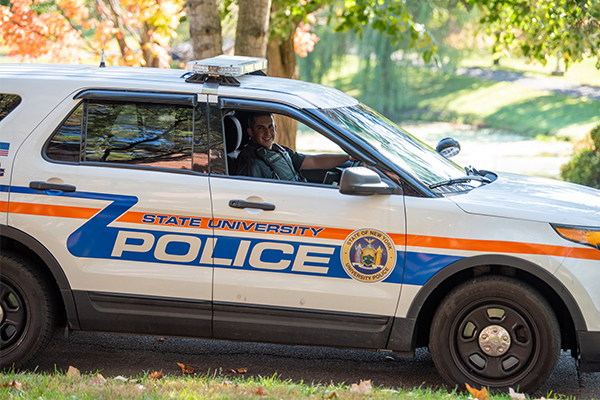SUNY New Paltz UPD will adopt use of body cameras following Advisory Committee recommendation
The following announcement was sent to all students, faculty and staff by email on Nov. 15.
Dear Campus Community,
The use of body cameras by police has shown to be a powerful tool in shedding light on critical interactions between law enforcement and the communities they serve. The University Police Department (UPD) Advisory Committee, in partnership with former Chief Mary Ritayik and Acting Chief Michael Corbisiero, have recommended the adoption of body cameras by SUNY New Paltz UPD. The UPD Advisory Committee, formed in February 2021, includes students, faculty, staff and alumni with considerable experience in community policing.
The adoption of this best practice brings UPD in line with New Paltz Police Department’s current use of body cameras, which provides important continuity as our mutual aid agreement frequently means that officers from both departments respond to critical events.
The policies that govern SUNY New Paltz use of body cameras are uniform across the SUNY system and have been approved by the Governor’s Office of Employee Relations (GOER). The campus does not have latitude to alter these policies without approval from GOER. These policies mandate body camera use in most law enforcement situations, and also limits their use in locations where individuals have a reasonable expectation of privacy, such as residences or bathrooms, when individuals may decline to be recorded unless the recording is being made pursuant to an arrest or search of the residence or individuals. The policy states that members of the public are to be notified that the interaction is being recorded, unless notification could compromise the safety of any person or impede an investigation. Cameras are not activated when interviewing the victim of a sex crime. In all other cases the body camera must remain activated. Consent is not required to start or continue recording.
The UPD Advisory Committee believes the benefits of body cameras worn by law enforcement officers are “Better transparency and accountability with the University community, increased civility and compliance and quicker resolution of complaints and misconduct, among other things.” They also advise that transparency and training be the hallmarks of this implementation. We will carefully assess this program and adapt as needed with UPD Advisory Committee input. Use of body cameras will begin once the equipment is secured, as early as January 2022.
While we are taking this step for the benefit of our campus community, we acknowledge that the use of body cameras is far from a panacea to end problematic encounters. While body cameras are one potential tool to hold officers, and the public, accountable for their actions (see this NPR story on recent research), the footage they capture offers a single perspective. Still, it is our belief that the introduction of body cameras and continued use of dash cameras will serve our community well. We will closely monitor their use and impact going forward.
Sincerely,
Donald P. Christian, President
Stephanie Blaisdell, Vice President for Student Affairs

